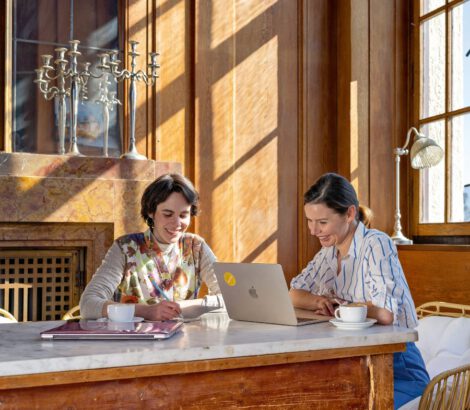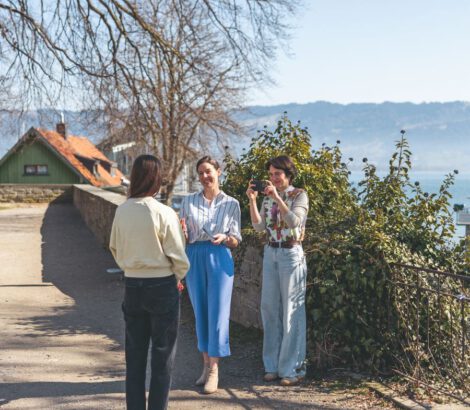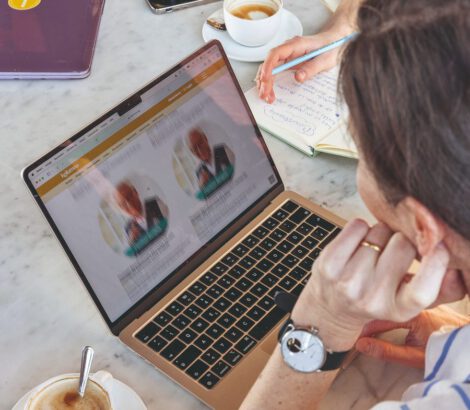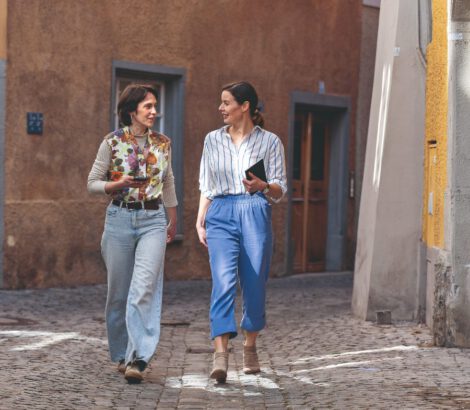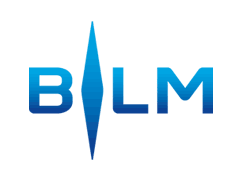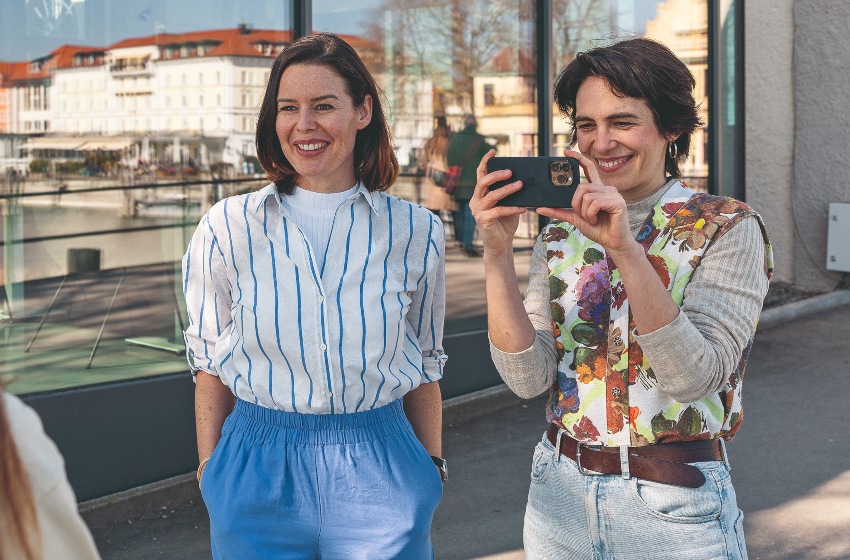
Kolumna: A hyperlocal news magazine from southern Bavaria
Major newspapers are closing their local offices, regional papers are cutting back on staff. Founding a digital, local news magazine seems almost crazy in this context. Julia Baumann-Scheyer and Ronja Straub from Lindau on Lake Constance have dared to do just that: with Kolumna, they are focusing on hyperlocal journalism. They are convinced that genuine proximity and credible reporting are exactly what readers want today.
Authentic stories instead of fleeting headlines, in-depth research instead of quick news. ‘I sense a longing for authenticity – not only in myself, but also in the people here in Lindau,’ says journalist Julia Baumann-Scheyer. Baumann-Scheyer and her colleague Ronja Straub are local journalists with heart and soul. For years, they worked for the Schwäbische Zeitung, Baumann-Scheyer as head of the Lindau local editorial office and Straub as her colleague. But they saw how the industry was changing. Production costs are rising, digital competition is fierce and advertising revenues are falling – forcing large publishers to cut costs. At the expense of local journalism. The big local issues still make it into the newspaper, but the hyperlocal, the very small stories on our doorstep, are increasingly falling by the wayside.
This is where Baumann-Scheyer and Straub saw their opportunity. In their view, Lindau needs local news – not just from the town hall, but also from the surrounding villages, clubs and local council meetings. The journalists founded their own digital magazine and named it Kolumna. At Kolumna, it's not just what is reported that matters, but also how: Kolumna always considers content in terms of format. A daily newsletter summarises the most important topics at Kolumna, and the whole story can be found on the website. The stories are teased on Instagram. In the Kolumna podcast, people from the region talk about what moves them. And an events calendar informs readers about all the important events.
The challenge of financing
Launching a hyperlocal digital newspaper at a time when more and more local editorial offices are closing is financially risky. There is hardly any government funding available. ‘Instead of raising €100,000 through crowdfunding and ending up without a community, we decided to go straight for subscription sales,’ says Straub. Their goal for the launch: 700 subscriptions, then they would be ready to go. In November 2024, Straub and Baumann-Scheyer began promoting Kolumna. They did so in a classic, analogue way, visiting shopping centres, Christmas markets and clubs to present their concept. ‘In the end, the subscribers we had already acquired acted as multipliers. This word-of-mouth advertising helped us a lot,’ says Straub. In February 2025, they were able to launch Kolumna, and by the beginning of April, they already had 800 subscriptions.
They intend to continue financing themselves through subscriptions and advertisements in the future. Kolumna currently costs twelve euros per month, with sponsorship subscriptions available for 25 euros per month. For the first six months, the journalists are receiving a start-up grant from the employment office – the subscription income goes entirely into the project. They do not intend to skim off any profits after that either: whatever comes in will be reinvested. That is what the two have promised each other.
Credibility through constructive journalism
According to the Hamburg Media School's ‘Wüstenradar’ study on the decline of newspapers in Germany, there is not yet a news desert at the local level, but a clear trend towards desertification is evident. ‘In some parts of Germany, journalists have to report on communities they have never been to before,’ says Baumann-Scheyer. For her and her colleague Straub, it's different. They both live locally, have a large network and a feel for the region. ‘We talk to the citizens, listen to them and verify everything through multiple sources,’ says Baumann-Scheyer. ‘It often happens that the media across Germany quote each other. We don't copy from third parties.’
They also want to avoid push notifications and sensationalist reporting, focusing instead on constructive journalism. Kolumna reports critically, provides comprehensive information on topics and, at the same time, tries to offer solutions. Especially when it comes to negative news, Kolumna takes its readers by the hand and puts things into a larger context. For example, when a fire recently broke out in an apartment building, the fire brigade ran out of water. It had to be replenished from other districts, and even a swimming pool was used. But instead of jumping to conclusions, Kolumna spoke to the mayor, the water supplier and the fire chief – and provided a thoroughly researched, factual assessment. According to Straub and Baumann-Scheyer, this is the only way authentic and, above all, credible journalism can work. Comments on the website and emails confirm that this approach is well received by readers.
A 2024 study by the Hans Bredow Institute on trust in established news sources shows that only 43 percent of adult internet users in Germany believe that most news can usually be trusted – the lowest figure ever. ‘The profession has suffered enormously in recent years. Time and again, we journalists have to defend ourselves against accusations of fake news and lying press,’ says Straub.
The two see their work as a clear democratic mission and take the watchdog function of journalism seriously. "Kolumna is intended to give the people of Lindau the feeling that someone neutral is keeping an eye on things. We make sure that taxpayers' money is used fairly, that no one is ripped off, that there is no backroom dealings,‘ says Baumann-Scheyer. ’You can only be part of a democracy if you are informed. And basically, I see that as the task of local journalism. Everyone should be able to form their own opinion," adds Straub. Years of experience have shown them that it is important to always explain transparently to readers how a journalistic product came about. In practice, this means that Kolumna explains why the journalists consider a topic relevant or why certain people were given a voice and others were not.
The community has a say
The community also plays an active role in shaping Kolumna. Readers do not write their own articles, but there is a readers' advisory board and a virtual mailbox on the homepage where Lindau residents can submit topic suggestions. People are happy to take advantage of this opportunity, says Baumann-Scheyer: "Of course, we can't cover all topics; some are only relevant to a very small number of people. We also have to manage our own resources." So far, Straub and Baumann-Scheyer are the only full-time employees. They have a few part-time staff, such as a community manager, a podcast host, an advertising salesperson and freelance journalists who write articles on a fee basis. In order to be even closer to its readership, Kolumna also plans to conduct surveys in the near future. In addition, there has been a so-called pop-up editorial office since the beginning. This means that the journalists work in public places and anyone interested can look over their shoulders and offer criticism or suggestions.
Another stated goal is to reach young people in Lindau. ‘Previous generations simply inherited the local newspaper; it was still an integral part of the breakfast table,’ says Straub. ‘This is no longer the case, especially among younger people, who have less connection to local news.’ Kolumna wants to change that: through more social media presence, such as an Instagram channel, and its own student editorial team. Currently, its readers are between 40 and 70 years old. But that is also a success: many older people are wary of digital technology, but trust Kolumna enough to venture online. For Baumann-Scheyer and Straub, this is a sign that their work is appreciated.
The two journalists hope that Kolumna will establish itself as a stable medium in the future, with a larger, diverse team that reflects all facets of Lindau's stories. And perhaps, says Baumann-Scheyer with a laugh, in five years' time there will even be a workflow that allows for a free weekend now and then.
Bannerbild: Photos: Philip Herzhoff

